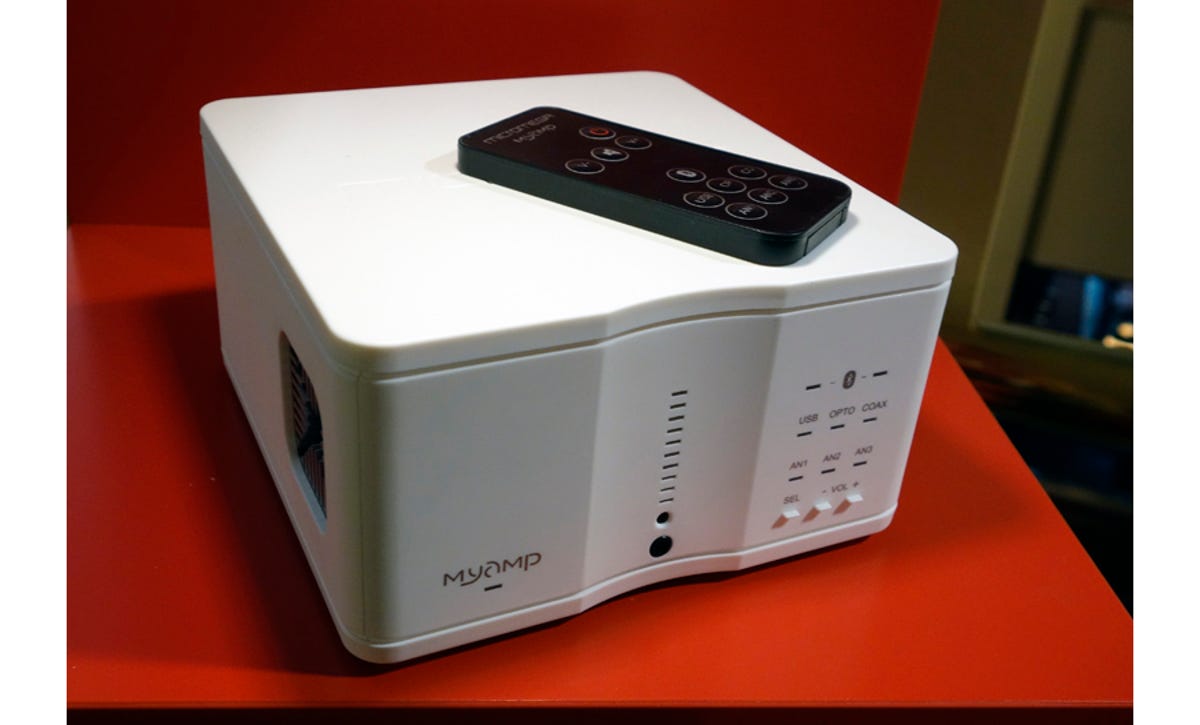
Steve Guttenberg/CNET
I have to admit that at first glance I didn’t take the Micromega MyAmp too seriously. It was little and cute, but then the extruded metal heat sinks visible on both sides of the amp caught my eye. As I lingered it started to become clear MyAmp wasn’t just another mini amp, designed for buyers who prioritize compact size over sound quality. Rather than just stuff a cheap Class D chip amp inside the box, Micromega engineers went with Class AB power, just like a real amp.
It’s the smallest bona fide high-end amp I’ve ever tested, just 5.5 by 6.5 by 2.9 inches (140x165x75mm) and it’s available in black or white finishes. While the vast majority of consumer electronics, everything from phones, tablets, TVs and cameras, are made in China, Micromega is a French company and they decided to make the MyAmp in France. Quality control is assured, so the MyAmp gets built exactly the way Micromega wants it.
I was a little disappointed to see that MyAmp’s outer skin is ABS plastic, but then I saw that the little guy doesn’t come with a wall wart, it has an internal power supply so the MyAmp plugs directly into your AC wall outlet.
Connectivity is surprisingly generous, considering the rather limited space for jacks. You get three pairs of line-level, analog RCA inputs, optical and coaxial digital inputs, USB input, an aptX Bluetooth port, RCA subwoofer output, a 3.5mm headphone jack, and speaker wire connectors. You can pair up to eight Bluetooth devices with the MyAmp. The onboard converters handle up to 192kHz/24 bit digital audio over the coaxial and optical inputs, 96kHz/24 bit over USB.
Power is rated at 30 watts per channel for 8-ohm speakers, 60 watts per for 4-ohm speakers. That’s impressive, the MyAmp doubles its power output into low impedance speakers; you won’t see too many AV receivers that can do that. The credit-card style remote looks and feels generic, but I like the fast volume ramp up or down when you press the volume button, and the slow changes in volume when you tap the buttons. I also like the vertical row of LEDs that indicate volume level setting, but the plastic control buttons on the MyAmp faceplate feel out of place in such an innovative design. I did notice a small amount of fan noise emanating from the MyAmp’s insides, but only when I was changing CDs or LPs. With the music on, the noise was inaudible.


Micromega
It’s clearer sounding than the similarly featured PS Audio Sprout. That amplifier is fuller and richer, but also sounds sluggish next to the nimble MyAmp. There’s a softness to the Sprout’s sound that makes everything sound a little bland; the MyAmp is more precise and presented sharper soundstage focus. MyAmp was also more see-through transparent than my NAD C316BEE integrated amp.
Mated with a high-resolution speaker, like the Wharfedale Jade 3 and Chane A1rx-c speakers, the MyAmp will supply audiophile-grade sound quality — it’s a serious component. It’s not the most powerful amp you can buy for the money, and bass oomph isn’t in the cards, but in day-to-day use, I found a lot to like about the MyAmp’s sound; it’s crisp and clear, and soundstage depth is remarkable.
My Audio Technica ATH-M50x and old Bowers & Wilkins P5 headphones sounded fine, but all the headphones I tried with inline controls and mics were incompatible with MyAmp.
The US price is $649, and it’s available on Amazon. In Australia it’s AU$875, and the UK price is £479.




